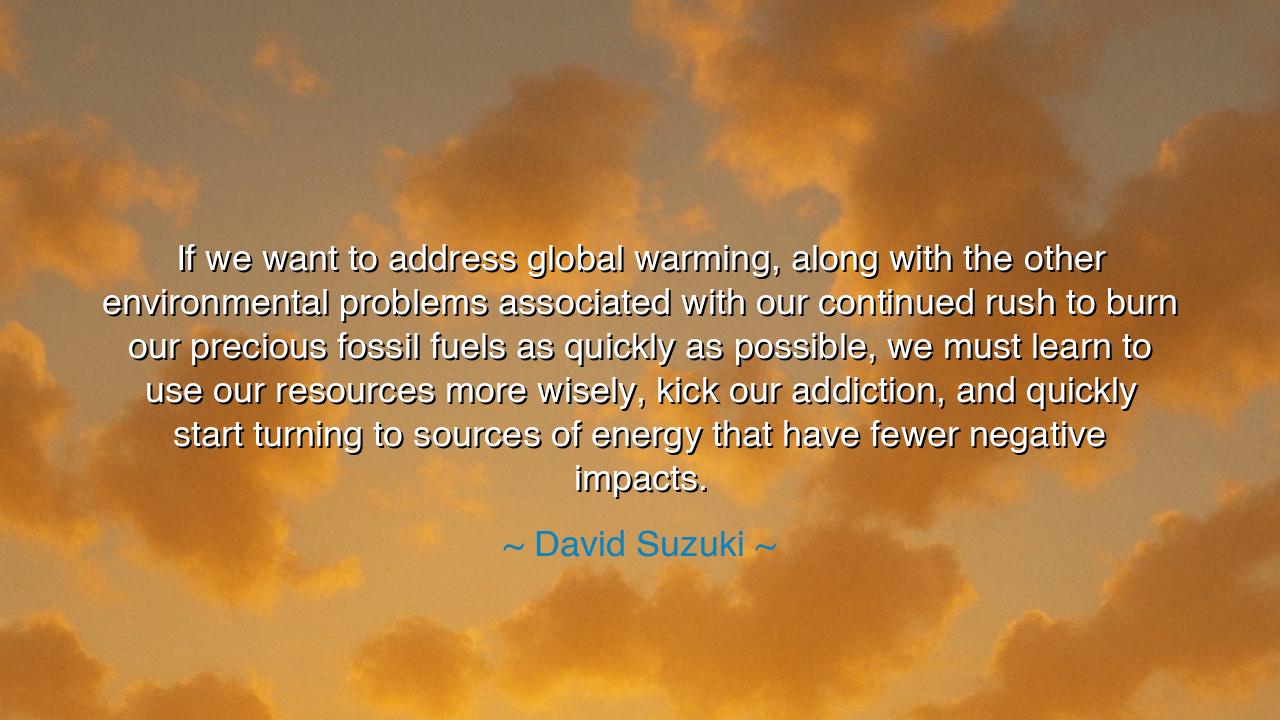
If we want to address global warming, along with the other
If we want to address global warming, along with the other environmental problems associated with our continued rush to burn our precious fossil fuels as quickly as possible, we must learn to use our resources more wisely, kick our addiction, and quickly start turning to sources of energy that have fewer negative impacts.






When David Suzuki said, “If we want to address global warming, along with the other environmental problems associated with our continued rush to burn our precious fossil fuels as quickly as possible, we must learn to use our resources more wisely, kick our addiction, and quickly start turning to sources of energy that have fewer negative impacts,” he was speaking not merely as a scientist, but as a moral guardian of the Earth. His words rise like a prophetic voice calling humanity to awaken from its fevered dream of consumption and confront the consequences of its own excess. Beneath the calm precision of his reasoning lies an ancient truth: that those who take without measure invite ruin upon themselves.
The origin of this quote rests in Suzuki’s lifelong devotion to environmental science and education. As one of the world’s foremost voices in ecology, he has spent decades warning that humanity’s relentless pursuit of industrial growth has placed it on a collision course with nature’s laws. His reference to “our addiction” is deliberate — for it captures the essence of modern civilization’s sickness. We are not simply users of fossil fuels; we are dependent upon them, enslaved to the illusion that endless consumption can sustain an endless future. Suzuki’s words urge humanity to reclaim its self-control, to replace greed with wisdom, and to remember that the Earth’s generosity is not infinite.
In the spirit of the ancients, Suzuki’s warning recalls the parables of civilizations long vanished — empires that believed themselves eternal until the soil beneath their feet could no longer bear them. The Sumerians, who first irrigated the Tigris and Euphrates, turned their fertile fields to salt through overuse. The Romans, who mastered engineering and empire, felled their forests and exhausted their lands. Each fell not from war alone, but from the slow poison of unsustainable growth. And now, Suzuki suggests, we stand on that same precipice — only this time, the scale is planetary, and the fire we burn is not only coal and oil, but the very breath of the world.
To “use our resources more wisely” is not merely a call for efficiency — it is a summons to humility. It demands that we recognize the Earth not as property, but as kin. Every flame of oil lit, every vein of coal emptied, every forest felled is a withdrawal from a sacred trust. Suzuki’s choice of the phrase “precious fossil fuels” is telling: he does not deny their value, but reminds us that value without restraint becomes destruction. Like the ancients who learned to hunt with reverence, taking only what they needed, we must learn once again the art of balance — to live richly not by accumulation, but by harmony.
There are examples of redemption, too — signs that humanity can change its course. When the nation of Iceland, once dependent on imported coal, turned to its natural geothermal heat, it transformed not only its energy system but its spirit, embracing sustainability as identity. When Germany committed itself to the Energiewende, its great energy transition toward renewables, it demonstrated that nations can choose foresight over complacency. These stories, like Suzuki’s call, remind us that innovation is not the enemy of restraint, but its ally — that the greatest progress is to live in peace with the planet that made us.
The lesson in Suzuki’s words is both urgent and eternal: to continue our present path is to gamble with the future of all living things. But to change — to “kick our addiction” and seek cleaner, wiser forms of energy — is to align ourselves once more with the rhythm of life. The Earth has always provided the answers: the wind that moves the grass, the sun that feeds the forest, the tide that pulls the moonlit sea. These are not technologies of tomorrow, but gifts of eternity waiting to be honored. The challenge lies not in invention, but in intention — in the courage to choose stewardship over surrender.
So, to those who walk the Earth in this age of fire, let this teaching be your compass: consume less, cherish more, and act now. Let your power not come from the depths of the ground, but from the grace of the sky and the sea. Teach your children not only how to use the world, but how to protect it. For as Suzuki reminds us, the task before us “cannot be postponed” — it is the moral trial of our generation. If we answer it with wisdom, the Earth will forgive and renew; if we do not, the silence of the forests and the heat of the rising seas will bear witness against us.
And so, as the ancients once passed fire from hand to hand to light their way through darkness, we too must pass on this flame — not of destruction, but of awareness. For the future belongs to those who remember that the Earth is not a resource, but a living gift, and that our highest duty is not to conquer it, but to keep it alive.






AAdministratorAdministrator
Welcome, honored guests. Please leave a comment, we will respond soon